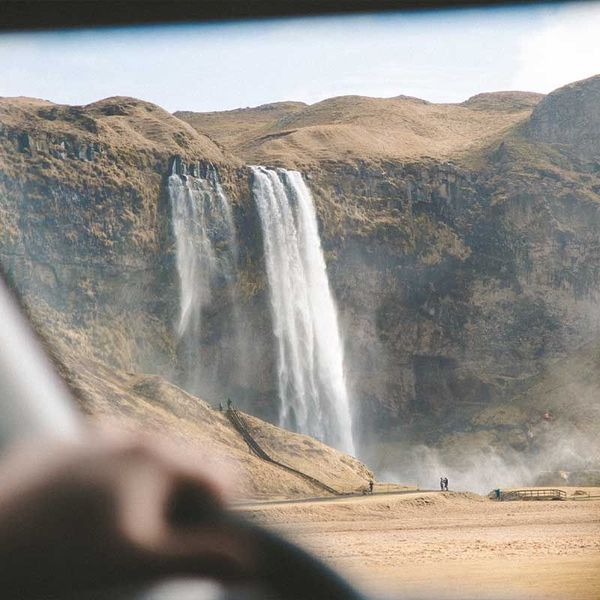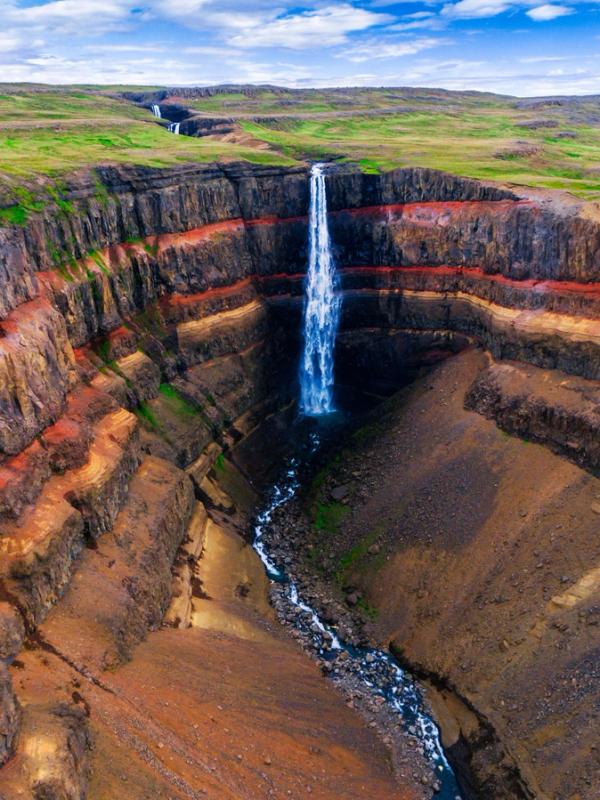
Discovering Hengifoss: Iceland's "Hanging Waterfall"
Ready for an adventure? Let me introduce you to Hengifoss Waterfall, one of the coolest spots in East Iceland. Towering at 128 meters (420 feet), Hengifoss is one of the tallest waterfalls in the country. Nestled in the Fljótsdalur Valley, this natural wonder is a must-see if you're exploring the Eastfjords. Here’s your simple guide to make the most out of your visit.
Why is Hengifoss Worth a Visit?
Hengifoss isn’t just tall; it’s stunning. The waterfall’s dramatic drop is backed by red and black layers of rock—leftovers from ancient volcanic eruptions—that make it look like something out of a painting. And the best part? The hike up to Hengifoss also takes you past Lítlanesfoss, another beautiful waterfall surrounded by cool basalt columns. Plus, because it’s a bit off the beaten path, you won’t have to elbow your way through crowds to enjoy the view.
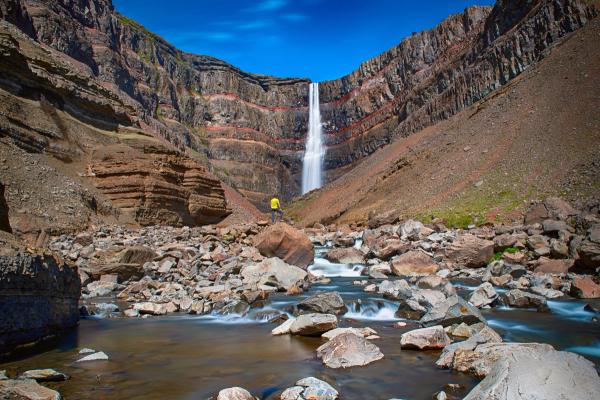
Hengifoss Facts & Features
Let’s break down why Hengifoss is so special:
Height and History
At 128 meters, Hengifoss is the third tallest waterfall in Iceland. Its steep drop and the unique red and black layers behind it are like a history book written in stone, telling the story of Iceland’s fiery volcanic past.
Geological Significance
Hengifoss sits in the Fljótsdalur Valley, near Lagarfljót Lake, an area rich with geological wonders. The red layers you see behind the waterfall are ancient clay trapped between lava flows. They’re a real treat for anyone into geology—or just cool-looking rocks.
Folklore
Iceland is big on folklore, and Hengifoss is no exception. The nearby Lagarfljót Lake is famous for tales of the Lagarfljót Worm, a mythical creature said to lurk in its depths. There are also plenty of stories about hidden people and trolls roaming the area, adding a bit of magic to your hike.
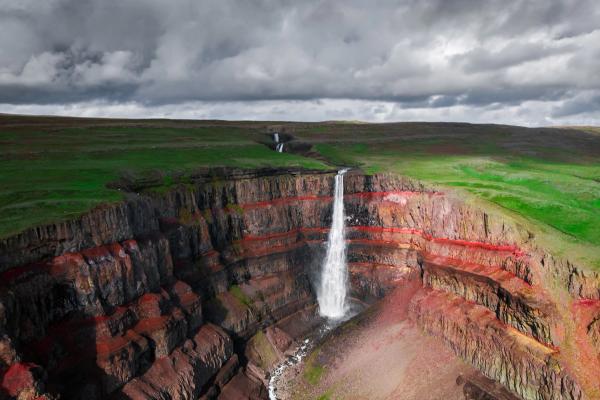
Where is Hengifoss and How to Get There
Hengifoss is tucked away in the scenic Fljótsdalur Valley, about 35 kilometers from the town of Egilsstaðir, which serves as the gateway to East Iceland.
The best way to get there is by renting a car. The drive is pretty straightforward, and it offers some beautiful views along the way.
From Egilsstaðir to Hengifoss
If you’re already in Egilsstaðir, you’re just a short drive away from Hengifoss. Here’s the simple route:
- Start in Egilsstaðir and head south on Route 931. This road runs along the eastern shore of Lagarfljót Lake, giving you some nice views of the water and surrounding landscapes.
- Drive for about 35 kilometers on Route 931 until you see the signs for Hengifoss. The road is paved and in good condition, so it’s accessible for any type of car.
- Arrive at the Hengifoss parking area, where you’ll find basic amenities like restrooms. The parking area is the starting point for your hike to the waterfall.
The Hike to Hengifoss
The hike to Hengifoss is about 2.5 kilometers each way, making it a nice 5-kilometer round trip. It’s a bit of a climb, but the views make it totally worth it.
Starting Point
The trail starts at the Hengifoss parking area. It’s well-marked and easy to follow, winding through the beautiful Fljótsdalur Valley. The path starts off gentle, but it gets steeper as you go.
Viewpoints
Along the way, you’ll find several spots where you can stop and take in the view. The first big one is Lítlanesfoss, a smaller waterfall with impressive basalt columns. It’s a great spot for a photo break. As you keep climbing, you’ll get even more amazing views of Hengifoss and the valley below.
Extended Trail
If you’re up for more exploring, the trail doesn’t stop at Hengifoss. You can keep going into the highlands for some extra adventure. This extended hike gives you even more chances to soak in the stunning scenery, including views of Snæfell Mountain in the distance.
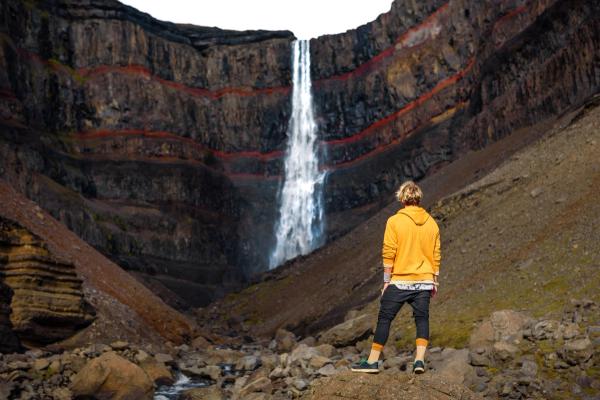
Best Time to Visit Hengifoss
If you want to see Hengifoss at its best, plan your visit between June and August. The weather’s friendlier, the trail is easy to hike, and the green landscape makes the waterfall look even more stunning. Fall (September to October) is also a good time to go if you’re into autumn colors. Winter, on the other hand, is for the brave—the trail can get icy, and the waterfall might be frozen, but if you’re up for a challenge, it’s worth it.
What to Wear When Visiting Hengifoss
Iceland’s weather is famously unpredictable, so it’s best to dress in layers. Here’s a quick checklist:
- Sturdy Hiking Boots: Perfect for the rocky trail.
- Layered Clothing: Easy to adjust as the temperature changes.
- Rain Jacket: Because rain can sneak up on you.
- Hat and Gloves: It can get chilly, especially near the waterfall.
- Hiking Backpack: To carry your gear and any extras.
Surrounding Sites & Things to Do Near Hengifoss
While Hengifoss is the star of the show, there are plenty of other cool spots nearby to check out:
Lítlanesfoss
On your hike to Hengifoss, you’ll pass Lítlanesfoss, a smaller waterfall that’s definitely worth checking out. What makes Lítlanesfoss stand out are the tall basalt columns that surround it, almost like nature’s own picture frame. These rock formations were created by cooling lava, and they give the waterfall a unique, otherworldly look. It’s a great spot to snap some photos and take a breather before you continue your hike.
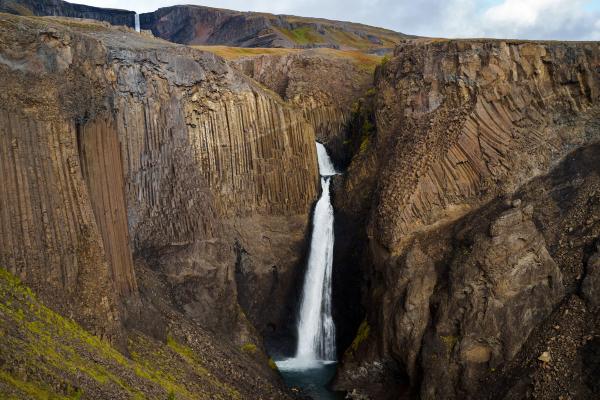
Hallormsstaðaskógur Forest
Just a short drive from Hengifoss, you’ll find Hallormsstaðaskógur, Iceland’s largest forest. This green oasis is a rare sight in a country known for its stark, rocky landscapes. The forest has a bunch of peaceful hiking trails that wind through groves of birch, pine, and larch trees. It’s the perfect place for a relaxing walk, a picnic, or just to chill out in nature. Birdwatchers will love it here, too—there’s plenty of birdlife to spot. And if you visit in summer, you might even catch an outdoor concert or event.
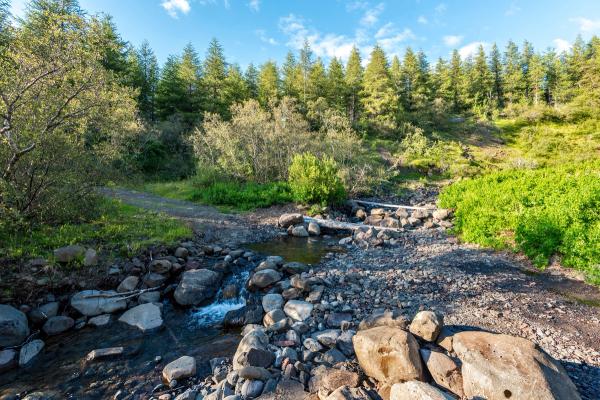
Lagarfljót Lake
Lagarfljót Lake, also called Lögurinn, stretches out along the Fljótsdalur Valley. It’s famous for the legend of the Lagarfljót Worm, a mythical creature said to live in its depths. Whether or not you believe in the worm, the lake is a great place for a scenic walk along the shore. The views are especially nice in the early morning or late evening. If you’re up for something different, you can hop on a boat tour and see the lake from the water, which gives you a fresh perspective of the surrounding mountains and valleys.
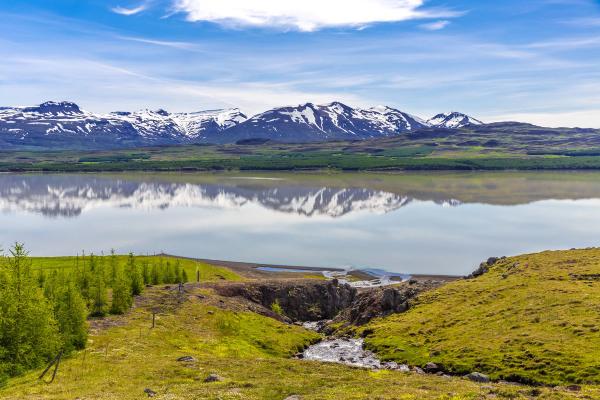
Vatnajökull National Park
If you have the time, Vatnajökull National Park is a must-visit, even though it’s a bit further away. This massive park is home to Vatnajökull, Europe’s largest glacier, and covers a huge chunk of Iceland. The park is packed with epic landscapes—think towering glaciers, deep valleys, and icy lagoons. Popular activities here include glacier hikes, exploring ice caves, and checking out the Jökulsárlón glacier lagoon, where icebergs float in clear, blue water. Whether you’re into hiking, photography, or just want to see something awesome, Vatnajökull National Park won’t disappoint.
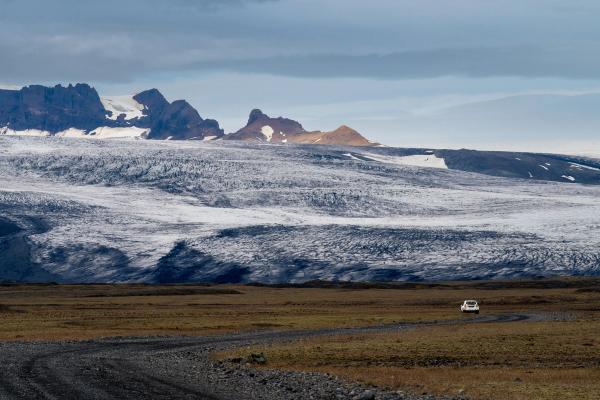
Seyðisfjörður
Seyðisfjörður is a coastal town that’s like something out of a postcard. It sits at the end of a narrow fjord, with colorful wooden houses that give the town a fun, artsy vibe. There are plenty of galleries, cafés, and shops where you can check out local art and crafts. If you like being outdoors, there are hiking trails that lead up into the mountains around the town, offering amazing views of the fjord and the ocean. In the summer, the town comes alive with festivals celebrating music, film, and art.
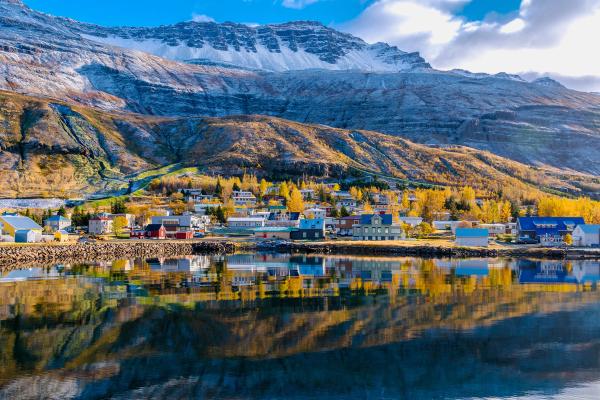
Snæfell Mountain
You can spot Snæfell Mountain from the Hengifoss trail, and it’s hard to miss—it’s the tallest free-standing mountain in Iceland, reaching 1,833 meters (6,014 feet). It’s a favorite among hikers and climbers, offering tough but rewarding trails. If you’re not up for the full climb, there are easier trails around the base that still give you awesome views of the highlands. On a clear day, you can see for miles, from the Vatnajökull glacier to the fjords of the East. Whether you’re into serious hiking or just want a good walk, Snæfell is a highlight of the area.
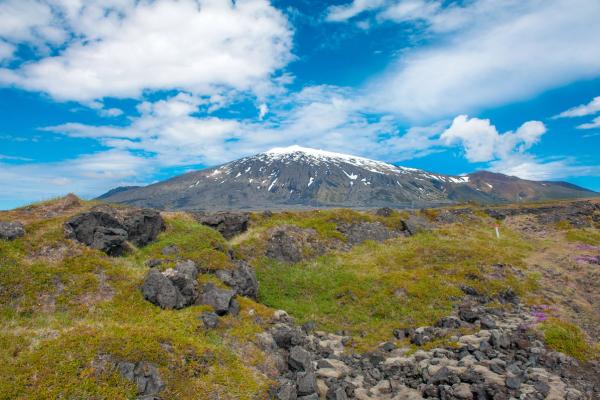
Conclusion
Hengifoss is one of those places that makes you fall in love with Iceland’s wild beauty. Whether you’re hiking up to get a closer look or just enjoying the view from the trail, Hengifoss is a spot you won’t forget. With its towering height, cool geological features, and the added magic of Icelandic folklore, it’s a must-see on any trip to East Iceland.

